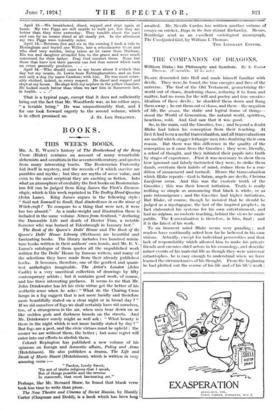BOOKS.
THIS WEEK'S BOOKS.
MR. A. E. WAITE'S history of The Brotherhood of the Rosy Cross (Rider) contains an account of many remarkable alchemists and occultists in the seventeenth century, and quotes
from many interesting tracts. The Rosicrucian Fraternity hid itself in mystery, and the records of it which survive arc parables and myths ; but they are myths of some valhe, and
even to the most sceptical they are exciting as fiction. Into what an atmosphere of credulity the first books on Rosicrucian- ism fell can be judged from King James the First's Damon-
ologie, which is this 'week reprinted in The Bodley Head Quartos (John Lane). King James argues in the following style : " Said not Samuell to Sault, 'that disobedience is as the sinne of Witch-craft 4? To compare to a thing that were not, it were too too absurd." As a make-weight and illustration there is included in the same volume Newes from Scotland, " declaring the Dainnable Life and death of Doctor Fian, a notable Sorcerer who was burned at Edenbrough in Ianuary last."
The Book of the Queen's Dolls' House and The Book of the Queen's Dolls' House Library (Methuen) are beautiful and
fascinating books. The library includes two hundred minia- ture books written in their authors' own hands, and Mr. E. V.
Lucas's catalogue of them quotes all the unpublished work written for the Dolls' House by famous writers, and many of the selections they have made from their already published books. It becomes, therefore, one of the gentlest and quain- test anthologies imaginable. The Artist's London (John Castle) is a very uncritical collection of drawings by fifty contemporary artists ; but it contains good work, of course, and has three interesting prefaces. It seems to me that Mr.
John Drinkwater has let his civic virtue get the better of his aesthetic sense when he asks : " What do the Charing Cross lamps in a fog suggest that is not more lucidly and therefore more beautifully stated on a clear night or in broad day ? " If we rid ourselves of fogs we shall certainly have rid ourselves, too, of a strangeness in the air, when men bear down on us like sudden gods and darkness broods on the streets. And Mr. Drinkwater surely might as well ask : " What beauty is there in the night which is not more lucidly stated by day ? "
But fogs are a pest, and the civic virtues must be upheld : the .sooner we are without them; the better ; but some regret will
enter into our efforts to abolish them.
Colonel Repington has published a new volume of his opinions on foreign and domestic affairs, Policy and Arms
(Hutchinson). He also publishes a drama, The Life and Death of Marie Stuart (Hutchinson), which is written in very
amusing verse
" Pardon, lovely Sweet, 'Tis not of truths religious that I speak, But of things possible and the reverse In statecraft, that most fascinating art."
Perhaps, like Mr. Bernard Shaw, he found that blank verse took less time to write than prose.
. The New Theatre and Cinema of Soviet Russia, by Huntly
Carter (Chapman and Dodd); is a book which has been long
awaited. Mr. Neville Cardus has written another volume of essays on cricket, Days in the Sun (Grant Richards). Messrs. Routledge send us an eveellent sociological monograph, The Unadjusted Girl, by William I. Thomas.
THE LITERARY EDITOR.










































 Previous page
Previous page